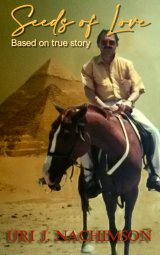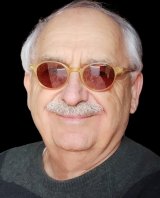Seeds of Love
He risked his freedom for the impossible love for an Egyptian woman. He smuggled forbidden seeds from Israel to a country where human life isn’t worth no more than a pack of cigarettes. Through Eric's adventures, you will become acquainted with real life in Egypt as he becomes familiar with it. A Romance was full of adventure, sex, and suspense...
Genre: Action and Adventure, Novel, Romance
Genre: Action and Adventure, Novel, Romance
- Year:
- 2017
- 404 Views
"Passport, please," the Egyptian border patrol at the Rafah crossing said to me in a thunderous voice. I handed him my Israeli passport, and he looked at the picture, lifted his head, and gave me a long, penetrating look. I tried to smile at him, but I was frozen with fear. Holding my passport in one hand, he wet the fingers of his other hand with his saliva and slowly began leafing through every page. It felt like an eternity. In my mind, I already saw myself lying in a cell on a concrete floor with a bucket full of excrement standing in the corner. He finally stamped my passport, stuck his hand through the small window, and returned it to me. I wanted to say "Thank you," but the words did not come out of my mouth. "Next," he shouted as he waved his hand for me to move on. I walked a few steps, and an Egyptian customs officer approached me. "Anything to declare?" he asked. I shook my head from side to side, but he did not let me through. "Open your suitcase," he ordered. I placed the suitcase on a low stool and opened it. It was a total mess, as I had no time to pack it neatly. Perhaps subconsciously, I wanted it to appear messy, for in case I was searched, they would not notice the "strange" boxes of Telma instant soups I had with me. He rummaged through the suitcase, skillfully inserting his hand underneath the clothing and feeling around without taking note of the three innocent-looking packages. When he ordered me to close my suitcase, I made every effort to return to a normal breathing rhythm and breathe slowly without showing any signs of anxiety. I was afraid that the pounding of my heart could be heard from a distance. I picked up my suitcase and walked towards the exit. In the plaza outside customs and passport control, buses were parked, waiting to take people to various points in Egypt. I got on the bus that was heading to Cairo. I waited until everyone had put their luggage into the luggage compartment, then I put mine in. The bus was packed with passengers, mostly Israeli Arabs and some tourists who sounded British. The heat was unbearable, and nobody was permitted to open a window. Of course, there was no air conditioning. My main concern was that the driver would not fall asleep while driving in the hot bus on the winding and monotonous road through the desert. After about two hours of driving in the oppressive heat and humidity, I could see the tops of palm trees, the town of El-Arish. The entire length of the trip, the sea was on the right side of the bus, while on the left side, we all saw stretches of desert with endless white dunes that changed shape with every wind gust. We passed the El-Arish and continued south. As we got closer to the Suez Canal, we passed rusty skeletons of burned-out tanks and trucks, remnants from either the War of Attrition or the Yom Kippur War, when Egypt mounted a surprise attack against Israel. After several hours of continuous driving, with my head swaying left and right from the zigzags the driver made as he attempted to avoid the potholes in the road, we finally arrived at El-Qantarah, one of the crossing points on the Suez Canal. After about an hour of waiting, during which time we had to remain in our seats, the bus drove onto a ferry that took us across the canal. Luckily the ferry ride was a short one. By this point, I was stuck in my seat from sweat. Once on the other side of the Suez Canal, the bus resumed its journey to Cairo through the city of Ismailia. At Ismailia, the bus driver stopped for a rest, and we were permitted to get off the bus; most people immediately ran to the bathroom. Fortunately, all I needed was to urinate. When I entered the stall, I nearly passed out from the pungent smell of urine, feces, and Lysol that hit me. The walls of the stall were smeared with layers of dry feces. There was no toilet, only a hole in the floor, full of excrement. I urinated while holding my breath and almost fainted from lack of oxygen. I ran out of the stall before I had completely emptied my bladder, so I wet my pants. In one of the nearby stalls, somebody was vomiting. The heat outside suddenly felt like a cool breeze compared to the inside of the bathroom. Little did I know that this experience was just a prelude to what awaited me in Egypt. I decided not to buy the coffee and sandwich that was being offered at the local kiosk for three Egyptian pounds. I boarded the bus and noticed that most passengers were pale and shaken. I smiled and thought I was not alone, as other passengers had had the same Egyptian "experience" as I had. A while later, I did not know how long, because I had lost all concept of time, I noticed small white houses with thatched roofs. The sign at the side of the road informed us that it was Ramadan City, which, as someone pointed out, was very close to Cairo. There were no people on the streets, but the number of houses was increasing, and there were more vehicles on the road. Indeed, not long afterward, we arrived at Heliopolis, which in Egyptian is called Masr el Gedida. The bus stopped at the front of Hotel Beirut, where I and some other passengers got off. The bus and the rest of the passengers continued to Cairo. "Welcome," is how the front desk receptionist greeted me with a big smile. "Marhaba," I answered him. Since I knew a few words of Arabic, I decided to try and use them. When I put my Israeli passport on the desk, his face suddenly became very solemn as he restrained himself, trying to act pleasantly. He gave me the keys to my room that had been prepared earlier and said that he would return my passport to me a bit later. "I am sure he is going to photocopy it and give it to the Mukhabarat," I thought. The next morning I went to my planned meeting with Washington Esposito. As soon as I went outside and headed for the taxi stand, six cab drivers jumped on me, each one insisting that he had the best and most comfortable cab. "Mister," one of them said while pointing to his cab. "My car is the most modern." I took one look at the cab and broke out in laughter. "Scrap metal," I mumbled to myself. In fact, all the taxis together looked like a junkyard.
Translation
Translate and read this book in other languages:
Select another language:
- - Select -
- 简体中文 (Chinese - Simplified)
- 繁體中文 (Chinese - Traditional)
- Español (Spanish)
- Esperanto (Esperanto)
- 日本語 (Japanese)
- Português (Portuguese)
- Deutsch (German)
- العربية (Arabic)
- Français (French)
- Русский (Russian)
- ಕನ್ನಡ (Kannada)
- 한국어 (Korean)
- עברית (Hebrew)
- Gaeilge (Irish)
- Українська (Ukrainian)
- اردو (Urdu)
- Magyar (Hungarian)
- मानक हिन्दी (Hindi)
- Indonesia (Indonesian)
- Italiano (Italian)
- தமிழ் (Tamil)
- Türkçe (Turkish)
- తెలుగు (Telugu)
- ภาษาไทย (Thai)
- Tiếng Việt (Vietnamese)
- Čeština (Czech)
- Polski (Polish)
- Bahasa Indonesia (Indonesian)
- Românește (Romanian)
- Nederlands (Dutch)
- Ελληνικά (Greek)
- Latinum (Latin)
- Svenska (Swedish)
- Dansk (Danish)
- Suomi (Finnish)
- فارسی (Persian)
- ייִדיש (Yiddish)
- հայերեն (Armenian)
- Norsk (Norwegian)
- English (English)
Citation
Use the citation below to add this book to your bibliography:
Style:MLAChicagoAPA
"Seeds of Love Books." Literature.com. STANDS4 LLC, 2024. Web. 20 Apr. 2024. <https://www.literature.com/book/seeds_of_love_1845>.




Discuss this Seeds of Love book with the community:
Report Comment
We're doing our best to make sure our content is useful, accurate and safe.
If by any chance you spot an inappropriate comment while navigating through our website please use this form to let us know, and we'll take care of it shortly.
Attachment
You need to be logged in to favorite.
Log In